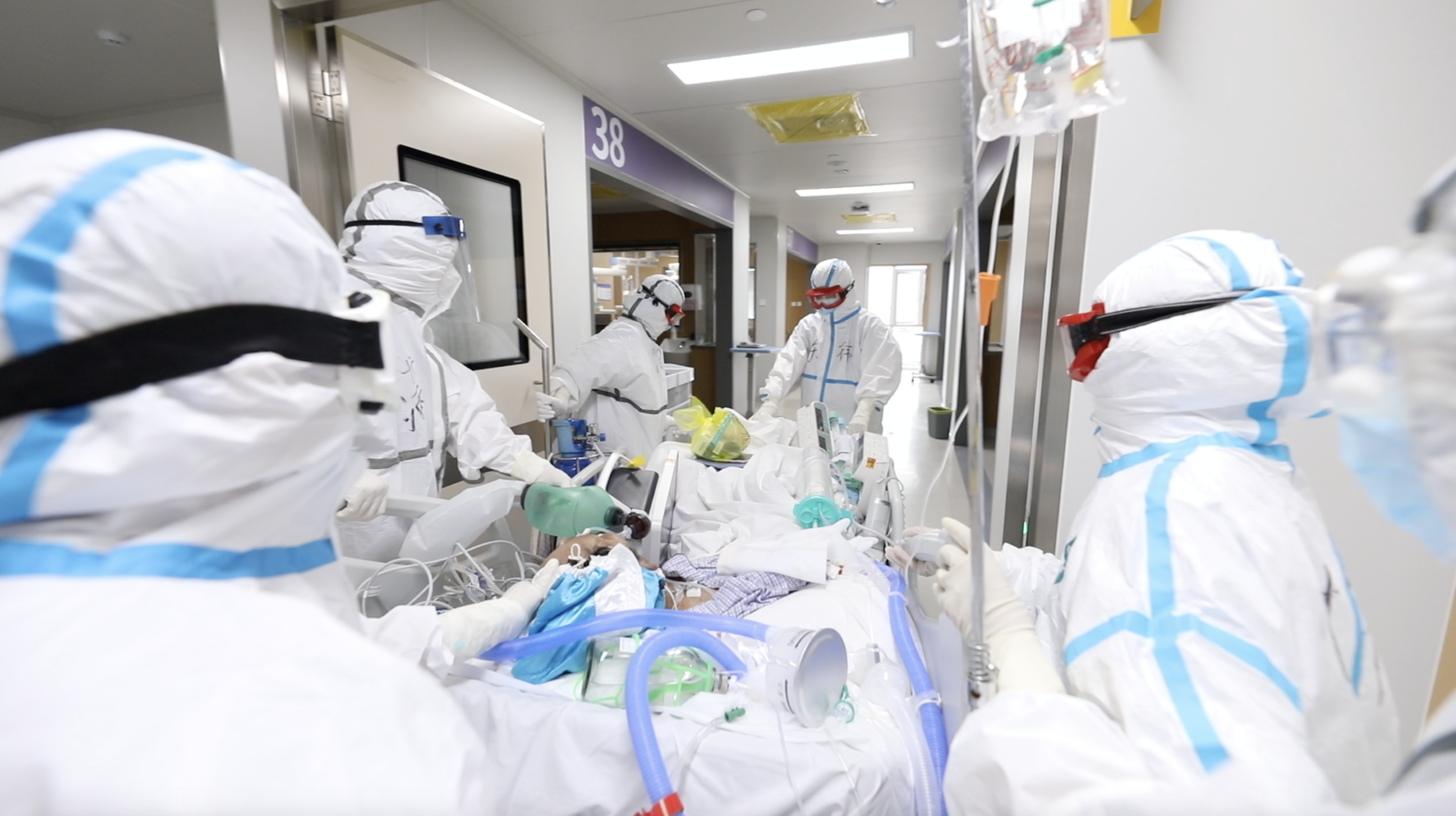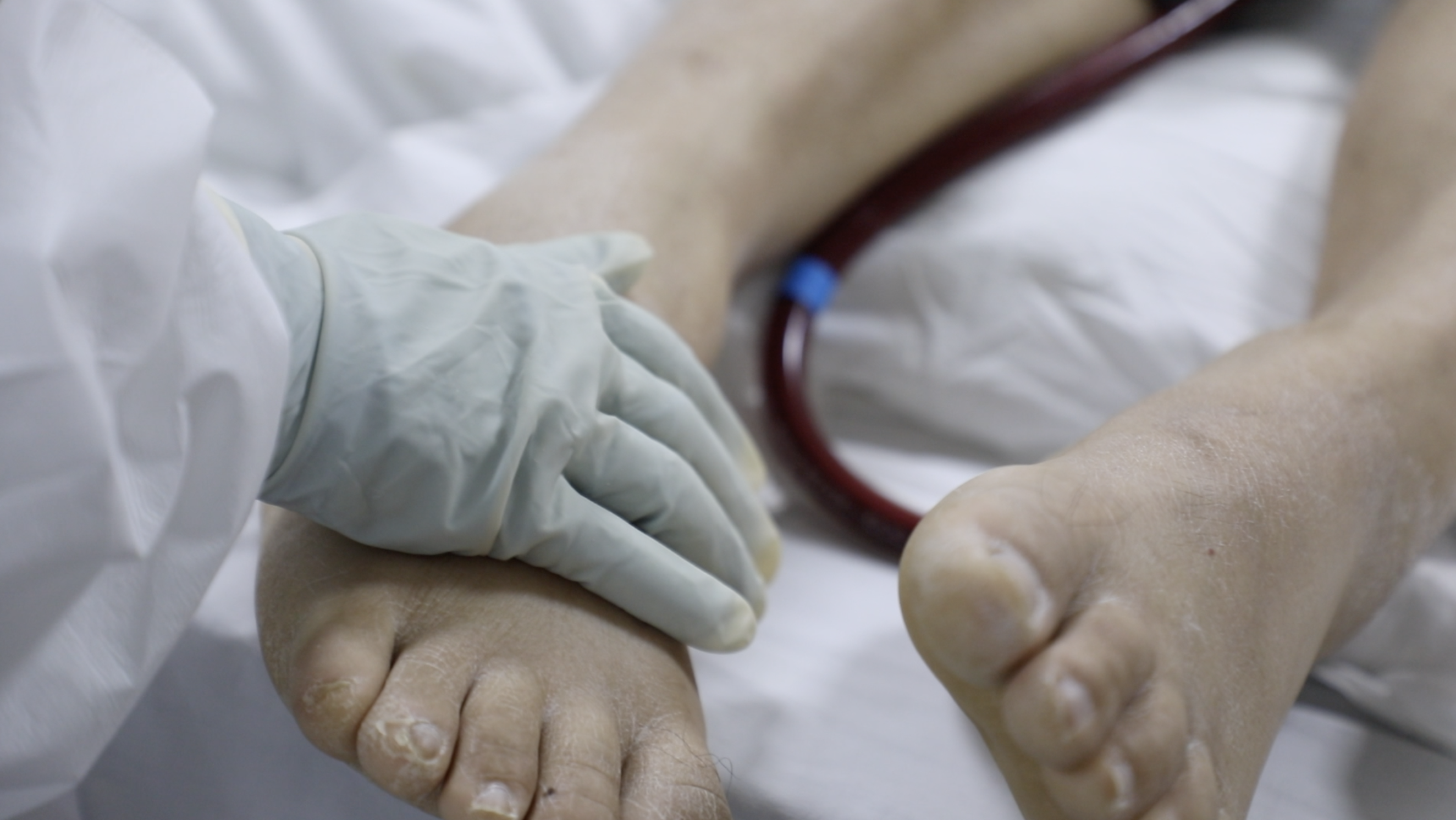02:57

What kept Su Xi, director of the Wuhan Asia General Hospital, up at night amid the coronavirus pandemic is a life-or-death decision: with limited hospital beds, who to keep and who to let go?
When the coronavirus struck Wuhan in early January, the hospital, with 1,100 beds and clean, spacious surgery rooms, became a war zone. Patients with severe breathing problems were flooding the wards, and a growing number of medical professionals at the hospital developed symptoms.
"Because we cannot even spare one bed, I have to be personally in charge of deciding who to keep at the hospital, and who to send back home for quarantine," Su said in an interview with CGTN. Every day, it is a tough decision, and to maximize the value of beds, only those with severe symptoms could stay.
Like hundreds of hospitals in Wuhan, the Wuhan Asia General Hospital has been at the frontline of combating the deadly pandemic. But unlike many, it is one of the few that joined the fight as a private hospital. The hospital, founded by Hong Kong businessman Tse Chun-ming in 2018, has treated 821 COVID-19 patients, and admitted more than 5,000 feverish patients since the outbreak.

A patient in critical condition is sent to the hospital's emergency room. /Su Xi
A patient in critical condition is sent to the hospital's emergency room. /Su Xi
On February 9, it was turned into a designated coronavirus hospital while taking charge of one temporary hospital with 996 beds, as confirmed cases peaked in Wuhan in early February.
The hospital was plagued by a shortage of protective gear: 2,000 N95 masks and 1,000 gowns are needed on a daily basis. The pandemic demanded more medical workers and, amid the Spring Festival break, there weren't many. "It was a total chaos," Su recalled.
Seasoned physicians from fields like otolaryngology or pediatrics were all pulled to bolster the workforce — they have less experience in dealing with infectious disease and lung problems. By January 20, medical professionals at the hospital had contracted the virus, said Su, prompting him to convert the intensive care units into isolation wards for feverish patients.
As the shortage of protective equipment and medical staff intensified, the hospital sought help from its funders, buying large amount of masks and protective gear with the aid of overseas hospitals and diverting 200 medical staff from another associated hospital in Wuhan.

A narrow tube is inserted into a patient's artery to monitor his vital signs. /Su Xi
A narrow tube is inserted into a patient's artery to monitor his vital signs. /Su Xi
'We are all medical professionals'
Though the number of private hospitals in China already outweighs that of public hospital — accounting for 63.9 percent of the total number — they are still not considered as the main provider of healthcare in the country. Since the vast majority of people in China have public insurance, private healthcare is considered out of reach for most everyday citizens.
More than half of private hospitals in China are specialized hospitals, which focus on elective services, such as dental care, while the rest typically cater to the needs of a small pool of people, such as expatriates and high-income residents.
In 2002, the Chinese government announced the plan to develop private healthcare system to relieve the strain on public hospitals. But after two decades of development, private hospitals still struggle with people's trust deficit.
At the initial stage of the pandemic, some questioned that if private hospitals stayed idle while public hospitals were scrambling to provide care to coronavirus patients.

A doctor conducts an operation despite his protective goggles fogging up. /Su Xi
A doctor conducts an operation despite his protective goggles fogging up. /Su Xi
While public hospitals are the greatest contributor to the COVID-19 fight, the role played by private hospitals is indispensable. In Wuhan, 24 private hospitals have been turned into designated hospitals to treat COVID-19 patients. Across the country, 634 private hospitals joined the fight against the coronavirus, hosting 3,419 patients.
"In the face of the pandemic, there is no difference between public and private hospitals," said Su while sharing his on the role of private hospitals, adding "We are all medical professionals."
Private hospitals in financial limbo
The sweeping damage the coronavirus has done to hospital operations have been indiscriminate. The regular doctor visits, emergency room arrivals and elective surgeries that are vital to the hospital's revenue all experienced a slump. According to research from the Institute of Asclepius Hospital Management, a healthcare consulting firm, among 316 hospitals in China, 90 percent faced capital shortages due to the coronavirus, among which 50 percent said they couldn't survive another two months.
And private hospitals found it even harder to get through. "Most private hospitals have little surplus at the end of the year, three months of expenses at its maximum," said Eric Chong, director of Guangzhou Asclepius Hospital Management Research Center. When the coronavirus hit at the beginning of the year, most hospitals were in financial limbo.
For the Wuhan Asia General Hospital, which has been in operation for only a year, the financial burden was deeply felt. As the hospital still has a large amount of outstanding loans, financial sustainability was a pressing problem.
On top of the financial strain was the psychological trauma that the pandemic has inflicted to medical professionals. "Many of them work around the clock on the frontline for so long, and it's exhausting both physically and mentally," said Su.
As the situation improves in Wuhan, all the coronavirus patients at the Wuhan Asia General Hospital recovered and were discharged. On March 20, the hospital resumed its normal operation, but patient volume still hasn't returned to normal because many patients fear being exposed to the virus.

Doctors at Wuhan Asia General Hospital at work. /Su Xi
Doctors at Wuhan Asia General Hospital at work. /Su Xi
A tiered health-care delivery system for coronavirus patients — designated hospitals for seriously-ill patients and temporary hospitals for mild-symptom patients — has enabled China to cope with the strain on medical resources, said Su.
In the longer term, the capacity of the primary healthcare system should be strengthened so that minor illnesses can be treated at primary or community health centers while severe diseases get referred to general hospitals in big cities, he added.
"Private hospitals play an important subsidiary role to public hospitals, and they have their unique advantages in meeting peoples' needs for medical care," said Su. In the fight against the coronavirus, everyone is in the same boat.
(Cover image by Feng Yuan)